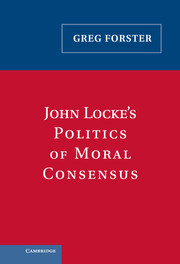Book contents
- Frontmatter
- Contents
- Acknowledgments
- List of Abbreviations
- John Locke's Politics of Moral Consensus
- 1 “Reason Teaches All Mankind, Who Will But Consult It”: John Locke and Moral Consensus
- 2 “Sit Down in Quiet Ignorance”: Locke's Epistemology of Limits
- 3 “The Candle of the Lord”: Locke's Rational Faith
- 4 “The Only Foundation of Faith”: Reasonable Christianity
- 5 “The Only True Touchstone of Moral Rectitude”: The Religious Foundations of Morality
- 6 “'Tis Reasonable to Think the Cause Is Natural”: Locke's Religious Eudemonism
- 7 “The Servants of One Sovereign Master”: Authority and Moral Consensus
- 8 “The Opinion of This or That Philosopher Was of No Authority”: Locke and Us
- Notes
- Bibliography
- Index
2 - “Sit Down in Quiet Ignorance”: Locke's Epistemology of Limits
Published online by Cambridge University Press: 17 August 2009
- Frontmatter
- Contents
- Acknowledgments
- List of Abbreviations
- John Locke's Politics of Moral Consensus
- 1 “Reason Teaches All Mankind, Who Will But Consult It”: John Locke and Moral Consensus
- 2 “Sit Down in Quiet Ignorance”: Locke's Epistemology of Limits
- 3 “The Candle of the Lord”: Locke's Rational Faith
- 4 “The Only Foundation of Faith”: Reasonable Christianity
- 5 “The Only True Touchstone of Moral Rectitude”: The Religious Foundations of Morality
- 6 “'Tis Reasonable to Think the Cause Is Natural”: Locke's Religious Eudemonism
- 7 “The Servants of One Sovereign Master”: Authority and Moral Consensus
- 8 “The Opinion of This or That Philosopher Was of No Authority”: Locke and Us
- Notes
- Bibliography
- Index
Summary
Locke's Essay Concerning Human Understanding must be the starting point for any proper understanding of the rest of his works. The Essay is logically first – its principles are the basis of everything else in Locke's philosophic system. The Essay settles the epistemological questions that must be settled before other questions, such as those in the fields of theology and political theory, can be raised. Locke did not explicitly draw this connection between the Essay and his other works, but he did hold that one's view of epistemology defines one's view of everything else, and his other works presuppose epistemological commitments that are defended in the Essay.
This is not to say that Locke's other works spring forth from the arguments of the Essay as a matter of logical necessity. Locke's theological and political positions are not simply deduced from his epistemology as one might deduce a geometric proof. Another way of putting this is that Locke's theology and politics are not the only theology and politics that one could conceivably hold within the ambit of his epistemological system. Accepting Locke's epistemology does not necessarily entail accepting his theology and politics. However, rejecting Locke's epistemology does necessarily entail rejecting (or modifying beyond recognition) the bulk of his theology and politics.
Until recently, the most common view among Locke scholars was that the lack of an ironclad deductive connection between the Essay and Locke's other works implied that there was really no connection between them at all, or at least no important connection.
- Type
- Chapter
- Information
- John Locke's Politics of Moral Consensus , pp. 40 - 83Publisher: Cambridge University PressPrint publication year: 2005
- 1
- Cited by

